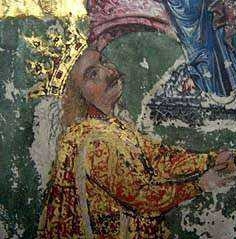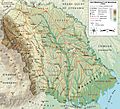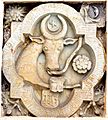Stephen III of Moldavia facts for kids
Quick facts for kids Saint Stephen the Great"Saint Voivode Stephen the Great" |
|
|---|---|

Miniature from the 1473 Gospel at Humor Monastery
|
|
| Prince of Moldavia | |
| Born | 1433 Borzeşti(?), Moldavia |
| Died | July 2, 1504 Suceava, Moldavia |
| Venerated in | Romanian Orthodox Church |
| Beatified | June 12, 1992, Bucharest, Romania by Romanian Orthodox Church |
| Canonized | July 12, 2006, Putna Monastery by Romanian Orthodox Church |
| Major shrine | Putna Monastery |
| Feast | July 2 |
| Patronage | Romania |
Stephen III of Moldavia, also known as Stephen the Great, was a very important ruler of Moldavia. He was born in 1433 and passed away on July 2, 1504. Stephen was the Prince of Moldavia from 1457 until his death. He is considered one of the most famous leaders from the House of Muşat, a family that ruled Moldavia for many years.
Contents
Who Was Stephen the Great?
Stephen the Great was a strong and wise leader. He ruled Moldavia for 47 years, which was a very long time back then. During his rule, he helped Moldavia become a powerful and respected country. He is often called "Stephen the Great and Holy" because of his achievements and his faith.
Becoming the Prince
Stephen became the Prince of Moldavia in 1457. A "Prince" was like a king or a main ruler of a region. Moldavia was a principality, which means it was a land ruled by a prince. Stephen worked hard to make his country safe and strong.
Protecting His Land
One of Stephen's most important jobs was to protect Moldavia. His country was located between powerful empires like the Ottoman Empire, Hungary, and Poland. These empires often tried to take control of Moldavia. Stephen fought many battles to keep his land free. He was a skilled military leader and won many important victories. These wins helped Moldavia stay independent for a long time.
Building and Culture
Stephen the Great was not just a warrior; he also cared about his people and their culture. He ordered the building of many churches and monasteries. These buildings were not only places of worship but also beautiful works of art. Many of them are still standing today and are famous for their unique architecture and frescoes. Building these structures showed his dedication to his country and his faith.
His Family and Legacy
Stephen the Great had a family, and his tomb is at Putna Monastery. He was buried there with his wife, Maria Voichița. His legacy, or what he left behind, is very important to Romanian history. He is remembered as a national hero who defended his country and helped it grow. He was later recognized as a saint by the Romanian Orthodox Church.
Images for kids
-
The Principality of Moldavia in 1483. This map shows the land Stephen ruled.
-
Sigismund Jagiellon, a Polish king who was sometimes involved in Moldavian politics.
See also
 In Spanish: Esteban III de Moldavia para niños
In Spanish: Esteban III de Moldavia para niños
 | Emma Amos |
 | Edward Mitchell Bannister |
 | Larry D. Alexander |
 | Ernie Barnes |









